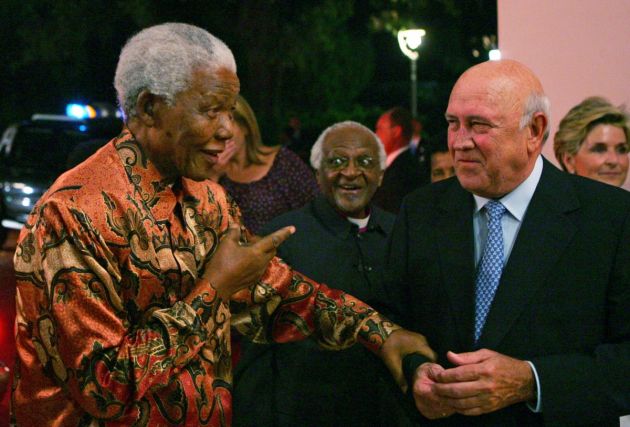Mandela: a 'colossus of unimpeachable moral character' says Tutu

Archbishop Desmond Tutu says that Nelson Mandela who died Thursday at the age of 95 "stood head and shoulders above his contemporaries and was a colossus of unimpeachable moral character and integrity."
South African President Jacob Zuma announced to South African and the world on at 8.50 p.m. Thursday that Nelson Mandela had died after a long illness.
Tutu who was also at the forefront of the fight against the racist system of apartheid in South Africa wrote in All Africa that his fellow Nobel Peace Prize laureate is mourned by all South Africans.
"Looking for comparisons beyond Africa, he will go down in history as South Africa's George Washington," said Tutu.
The former Anglican Archbishop of Cape Town who was a personal friend of Mandela's said he was "a person who within a single five-year presidency became the principal icon of both liberation and reconciliation, loved by those of all political persuasions as the founder of modern, democratic South Africa."
Tutu wrote in London's Independent newspaper, "Madiba's [Mandela's clan name] own passion for equality and democracy as well as the enjoyment of inalienable rights for all must, to a very considerable extent, have been lit by the Biblical teaching of the infinite worth of everyone because of being created in the image of God."
Winnie Graham a former reporter on The Star newspaper in Johannesburg's wrote in the National Catholic Reporter on Thursday, "The role played by the clergy in the creation of a 'new' South Africa - and Mandela's innate faith in God - remains an untold, yet pivotal, chapter in his story. In his declining years, presidents and kings came to pay homage. In life, it was to churchmen he turned for advice."
She noted that although Mandela was known to keep his religious views private, he was always aware of the role the clergy could play in his vision for a nonracial South Africa.
"It was through church mission schools, he said, that he and his generation were educated," Graham wrote.
Mandela was aged seven when when he was enrolled the Clarkebury Missionary School in the Eastern Cape province by his mother.
The rest of his high school education was completed at the Healdtown Methodist College, a boarding school started by missionaries in 1845.
South African Roman Catholic Cardinal Wilfrid Napier told the Catholic News Service, "He's the only political leader I've known who's ... allowed himself to be defined in terms of his faith, not just in terms of political allegiance."
Mandela was born in July 1918 in the southeastern Transkei region of the Eastern Cape and began his career as a lawyer in Johannesburg in parallel where he also became a political activist.
In 1961 he became leader of the armed wing of the then banned African National Congress, Umkhonto we Sizwe (Spear of the Nation) and the following year underwent military training in Algeria and Ethiopia.
Later he was imprisoned for 27 years before becoming South Africa's first black president in 1994.

After only one term of five years in office Nelson Mandela handed over power to his successor Thabo Mbeki and spent much of his time fighting the scourge of AIDS.
